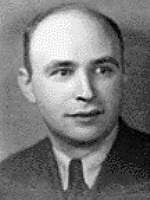Philosophy Pages
| Dictionary | Study Guide | Logic | F A Q s | ||
|---|---|---|---|---|---|---|
| History | Timeline | Philosophers | Locke | |||
Philosophy Pages
| Dictionary | Study Guide | Logic | F A Q s | ||
|---|---|---|---|---|---|---|
| History | Timeline | Philosophers | Locke | |||

|
Life and Works
Bibliography Internet Sources |
Gustav Bergmann studied mathematics, law, and philosophy in his native Vienna and participated in the Vienna Circle discussions of logical positivism. After emigrating to the United States in 1938, Bergmann taught in the Departments of Philosophy and Psychology at the University of Iowa for forty years, where his Philosophy of Science (1957) was the basis for a popular undergraduate course of study. Although he shared many of the substantive convictions of his fellow positivists, Bergmann was more keenly aware than most of the metaphysical commitments presupposed within their ways of thinking.
Pursuing methods of philosophical analysis derived from those of Moore, the early Wittgenstein, and Carnap, Bergmann sought to resolve philosophical problems by informally discussing the construction of an "ideal language" whose semantic features would indicate the most fundamental structure of reality. Thus, for Bergmann, the basic question of ontology is: what kinds of things must exist in order for us to devise a formal language in which everything can be perspicuously expressed?
In three collections of essays, The Metaphysics of Logical Positivism (1954), Meaning and Existence (1959), and Logic and Reality (1964), Bergmann sharply criticized the philosophical methods and results of his contemporaries, developing an extreme realism that drew him ever further from the mainstream of twentieth-century analysis. His Realism: A Critique of Brentano and Meinong (1967) returned to the work of Brentano and Meinong, significant figures from the turn of the century, for an understanding of philosophical difficulties against the background of which he could best express his own views. The posthumously published New Foundations of Ontology (1992) contains Bergmann's final reflections on the serious issues with which he had been concerned for many decades.
Bergmann's contributions to philosophy are explained, honored, and challenged in a collection of essays by his former students and colleagues, The Ontological Turn (1974).
|
Recommended Reading:
Primary sources:
Secondary sources:
Additional on-line information about Bergmann includes:
|
